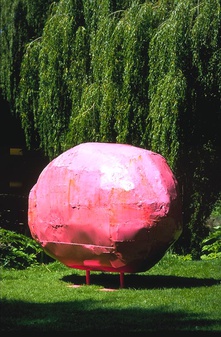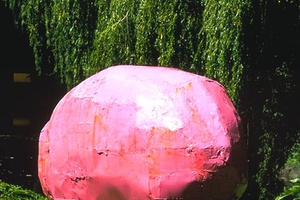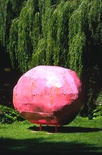Franz West
Warum ist etwas und nicht Nichts? [Why is Something and not Nothing?]
Three-part exhibition project, comprising two works in Münster and one work on the outskirts of Stronsdorf, near Laa an der Thaya, Austria
Location
Northern Promenade, east of the Promenade / Am Kreuztor crossroad.
Temporary installation for the duration of Skulptur. Projekte in Münster 1997
Etude de couleur [Colour Study]
1991
Installation
Copper piping, brass, lead, hosepipe, polyester
156 x 212 x 85 cm (urinal with privacy screen) and 13 x 100 x 1600 cm (walkway)
Autostat
1996
Sculpture made of sheet steel, painted pink, over an iron frame
160 x 460 x 100 cm
Franz West
* 1947 in Vienna, Austria
† 2012 in Vienna
For his second appearance at Skulptur Projekte, Franz West exhibited two already existing works near a pond along Promenadenring. Autostat, a sculpture of welded sheet steel painted a pale pink, was located on the eastern bank, where it stood out strikingly amidst the greenery. West installed Etude de couleur on the opposite bank, above the existing artificial waterfall. Its privacy screen of brightly-coloured synthetic panels appeared to allow men to urinate into the water. A 16-metre-long walkway made of colourful sheets of polyester led up to the free-standing “toilet facility”.
Autostat was the first work by West to pursue a primarily aesthetic approach. Originally created for a car manufacturer in 1996, the bulky, hollow sculpture was reworked and enlarged for Münster, where West placed it in a dialogue with its park-like surroundings and with an object that had the character of a functional and participative work. The constellation reflected the two opposite poles – utility value and sculptural autonomy – in West’s oeuvre.
The works exhibited at Münster under the overarching conceptual title Warum ist etwas und nicht Nichts? (Why is Something and not Nothing?) were directly related to a third sculpture in Austria. With its amorphous oval body painted pink, this sculpture – lying on the verge at the intersection of two single-track roads in the open countryside – resembles the work Autostat.1 West explained that, for him, the exhibition – happening at the same time, but geographically far apart – of three mutually related works under the same title represented penetrance “as a motif of multiplication”.2
Daniel Friedt
1 On this project, see also the entry on Franz West, Skulptur am Ortsrand von Stronsdorf published by the Department of Art and Culture, Lower Austrian Government. Online (in German) at: www.publicart.at/home.php?pnr=374&il=12&l=deu&weiter=0 (last accessed: 18.5.2017). A link to a short documentary video about the work can also be found on this page.
2 Franz West, “Warum ist etwas und nicht Nichts?”, in: Klaus Bußmann, Kasper König and Florian Matzner (eds.) Sculpture. Projects in Münster 1997, exhib. cat. Westfälisches Landesmuseum für Kunst und Kulturgeschichte, Münster, Ostfildern-Ruit, 1997, pp. 440–445, here p. 445.
Images
Location
- Still existing / Public Collection
- Removed
- In the museum
Other Participation
This artist also participated in: 1987
![Etude de couleur [Colour Study], 1991, Installation view 1997 © Archiv Franz West. Photo: Roman Mensing / artdoc.de Etude de couleur [Colour Study], 1991, Installation view 1997 © Archiv Franz West. Photo: Roman Mensing / artdoc.de](/media/cache/6e/7e/6e7e585b251c3cee842fc9f1308b2994.jpg)


![Etude de couleur [Colour Study], 1991, Installation view 1997 © Archiv Franz West. Photo: Roman Mensing / artdoc.de Etude de couleur [Colour Study], 1991, Installation view 1997 © Archiv Franz West. Photo: Roman Mensing / artdoc.de](/media/cache/4c/b1/4cb1e018eae8c824e1aa0fcea92ff169.jpg)
